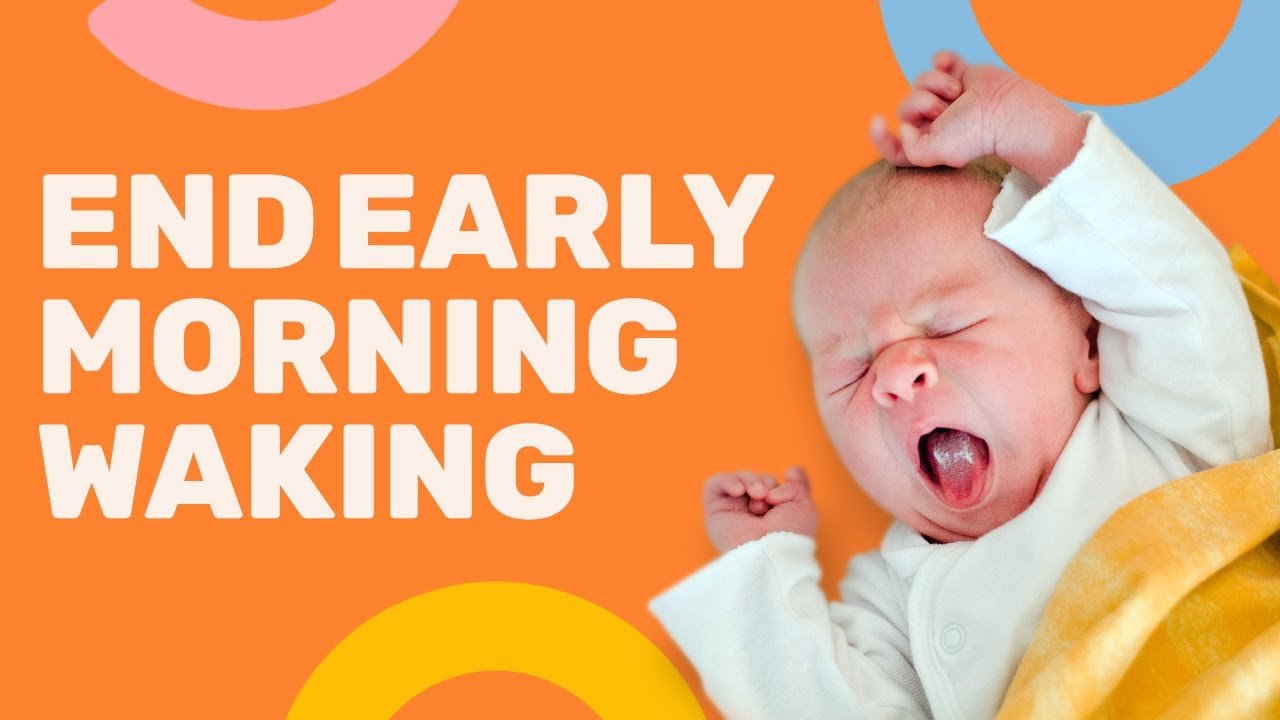Early morning wakes can be a struggle for parents with babies, but they don’t have to be a permanent fixture in your life. In fact, with a few small adjustments, you can get your baby to wake up at a more reasonable hour. By understanding the patterns and environmental factors that contribute to early morning wake-ups, you can implement steps to fix this habit. This article will outline age-appropriate schedules, treating early wakes like nighttime wakes, keeping the room dark, minimizing noises, using a white noise machine, and helping babies learn to fall asleep independently. Additionally, the article will touch on another common sleep problem for parents – short naps – and provide a video resource on how to extend them.
Early morning wakes are not an unavoidable part of parenthood – there are ways to change this pattern for you and your baby’s benefit. It’s crucial to understand why breaking the habit of early morning wakes can be challenging, as well as the factors that contribute to it. By following the steps outlined in this article, such as adopting an age-appropriate sleep schedule, treating early wakes as nighttime wakes, keeping the room dark, minimizing noises, using a white noise machine, and helping babies learn to fall asleep independently, you’ll be well on your way to resolving the issue. Additionally, the article will address another common sleep problem – short naps – and provide an informative video on how to extend them.
Understanding Sleep Patterns in Babies
Healthy sleep habits are crucial for the overall well-being and development of babies. Sleep plays a vital role in brain development, memory consolidation, and emotional regulation. Establishing good sleep patterns early on can promote healthy sleep habits throughout childhood and adolescence. On the other hand, common sleep problems in babies, such as early morning wakes and short naps, can disrupt their sleep schedule and lead to crankiness and overtiredness. In this article, we will explore the importance of healthy sleep habits, common sleep problems in babies, and effective strategies to address these issues.
Importance of Healthy Sleep Habits
Healthy sleep habits have numerous benefits for babies. A sufficient amount of sleep promotes physical growth, brain development, and cognitive function. It also enhances a baby’s mood, decreases the risk of behavioral problems, and improves their ability to self-regulate. Furthermore, good sleep habits contribute to optimal immune function, as sleep aids in the production of cytokines, which help the body fight off infections.

Common Sleep Problems in Babies
While every baby is different, there are some common sleep problems that many parents face. One of the most prevalent issues is early morning wake-ups. Babies often wake up early due to a combination of factors, including their sleep patterns and environmental factors such as light and noise. Another common issue is short naps, where babies struggle to sleep for extended periods during the day. These sleep problems can disrupt their overall sleep schedule and lead to overtiredness and irritability throughout the day.
Causes of Early Morning Wakes
Understanding the causes of early morning wake-ups is essential in effectively addressing this sleep problem. When babies wake up between 4:00 or 5:00 in the morning, it can be challenging to get them back to sleep due to several factors. Firstly, their sleep pressure is low as they have already slept for 8 to 10 hours. Secondly, as the sun rises, their melatonin levels drop, signaling their body that it’s time to wake up. Lastly, sleep is typically light in the early morning, making it easier for babies to be disturbed by environmental noises or discomfort.
Fixing Early Morning Wake-Up Habits
To address early morning wake-ups, it is crucial to establish an age-appropriate schedule for your baby. Following a schedule that ensures your baby gets the right amount of sleep during the day will help them stay asleep for 10 to 12 hours at night. Treating early wake-ups like nighttime wakes by keeping the room dark, quiet, and staying in bed until the desired wake-up time can also discourage the development of an early morning wake-up habit. In addition, creating a conducive sleep environment, minimizing household and neighborhood noises, and using a white noise machine can further promote better sleep.
Helping Babies Learn to Fall Asleep Independently
Another effective strategy in addressing sleep problems is helping babies learn to fall asleep independently. Teaching babies to self-soothe and fall asleep on their own can reduce dependency on external factors for sleep, such as rocking, feeding, or pacifiers. Establishing a bedtime routine, providing comfort objects, and using soothing techniques like gentle rocking or patting can aid in this process. Gradually reducing sleep associations can also contribute to babies learning to fall asleep independently and self-soothe when they wake up in the middle of the night.
Dealing with Short Naps
Short naps can be frustrating for parents, as they disrupt a baby’s sleep schedule and can lead to overtiredness. Understanding the reasons for short naps is crucial in addressing this issue effectively. Identifying sleep cues, establishing a nap routine, creating a calm sleep environment, and avoiding sleep associations can all contribute to improving nap duration. Additionally, there are techniques that parents can employ to extend short naps, such as gently rousing the baby before they fully wake and offering additional soothing techniques.
Additional Resources
If you need further guidance on managing short naps and extending them, we recommend watching a helpful video by Emma Hubbard. The video explores the reasons behind short naps and provides practical tips on how to extend them effectively. Watching this video can provide valuable insights and strategies for addressing short nap issues in babies.
In conclusion, understanding sleep patterns in babies and addressing common sleep problems can lead to improved sleep quality for both parents and babies. By establishing healthy sleep habits, addressing early morning wakes, helping babies learn to fall asleep independently, and managing short naps, parents can promote better sleep for their little ones. Remember that every baby is unique, and it may take some trial and error to find the strategies that work best for your child. With patience and consistency, you can help your baby establish good sleep habits and enjoy restful nights.

